Past Performance Evaluation at an Appraisal Meeting
Reviewing an individual's performance is the main thrust of the appraisal process. Your success in this meeting will depend on how well you have prepared, the quality of the data you have collected, and the quality of the review sessions you had throughout the appraisal period. You can use our Performance Data Gathering Checklist to help you to gather performance data throughout the year from a variety of sources.
If you use the OSCAR principles in managing performance you should avoid any nasty surprises. You will know what tone you wish to adopt for the meeting from the type of summary you have written and the nature of the review sessions you have had during the period. This could be one of recognition and mentoring; support and development; frustration and coaching; or disappointment and disciplining.
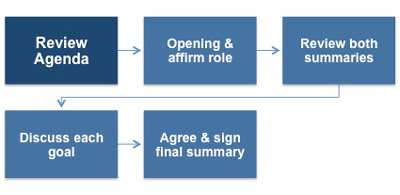 |
As a prerequisite to the performance review it is always advisable to reaffirm the employee's understanding of their role's functions as outlined in the job description and how this translates into their goals and levels of performance.
The choice is yours as to whether you run through your performance summary first or let your team member go through their response to your summary before you comment. You may chose the latter if you have found the individual's performance summary to be drastically different from your own and want to see what supporting information they have to support their view.
Both summaries should reflect the same level of understanding of the criteria on which the individual is being evaluated and have a clear definition of successful performance. This is especially important when you inherit an individual or team part of the way through the year.
The most appropriate structure and timings for the discussion is to work through the current year's goals in sequence for the meeting. Having set goals for your staff at the start of the period you know that these goals are set out in terms of their importance to the role and its contribution to the organization.
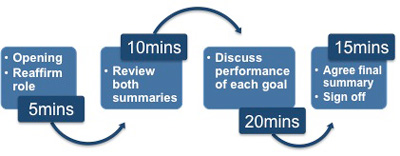 |
As you discuss each goal, you should take turns to explain the performance rating assigned to that goal and the supporting evidence for this decision. You should provide objective examples distilled from your own observations and reviews made during the appraisal period.
Your notes should include sufficient detail to demonstrate your awareness of and the importance you place on the individual's day-to-day work. There are many sources of performance data, for example from monthly reports, supervisors, time sheets, actions from meeting minutes, personnel records, and so on.
Without detailed notes and data you will undermine the legitimacy of the whole appraisal process and give the impression that the appraisal is a subjective exercise in which your 'opinion' and theirs are equally valid. The legitimacy of the appraisal process relies on it being seen as purely objective rather than being based on the working relationship and rapport you have with your individual team members.
When you share your ratings with the individual it is important to acknowledge the merits of their own rating first and then illustrate why your rating may differ. Where the performance ratings match, it is key to outline your reasoning. You do not want the individual to feel you have glossed over a goal performed well with a glib comment such as 'I won't go into detail about that since we're obviously in agreement.'
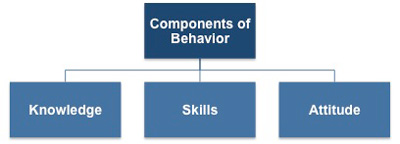 |
Where your ratings differ you should show how you arrived at your rating based on the performance data you have collected. You can relate the individual's performance to that stated in the goal and to what extent they demonstrated the competencies expected of the role.
The way you assess an individual's competencies is based on the behaviors they display in performing their role. You need to communicate what is expected of the individual in the role and outline how they will be measured by subdividing their behaviors into Knowledge, Skills, and Attitudes (KSA).
This is a complex area and you can read more detail about this part of the appraisal cycle in our free eBook, 'Developing Competencies.'
Where possible avoid starting the meeting with goals that you have rated differently to the member because this can send a negative message to them and create a hostile atmosphere from the outset. You should also avoid using vague terms like 'average' and 'satisfactory,' because they don't really explain how you derived your rating and show a lack of thought on your part.
Even if the individual is not fully persuaded that your ratings are fair and objective, they will at least come away with a better understanding of how their performance is measured and the level of performance that is expected in the future. Ensure you recognize successes and failures honestly in your assessment.
The key issue to understand is why they have not met the agreed goal and to discuss the causes and possible resolutions, which may include increasing available resources. You need to give careful consideration to any issue raised by the team member that sheds new light on your assessment, and be prepared to modify your rating if appropriate.
You can often find yourself having to ask an individual why they didn't meet their goal. In this instance be sure to ask in an objective way, giving credit for what was achieved, so that the real issues are raised. For example,
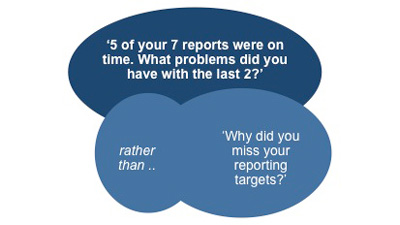 |
Your discussion of past performance should take about a third of the meeting, regardless of whether most of the feedback is positive or negative. If you have performed your coaching duties effectively throughout the year and given feedback in the regular reviews and as you gather data then nothing said during this part of the appraisal meeting should come as a surprise.
Also be mindful to ensure that your language is not contentious during the meeting, as you do not want to become embroiled in a legal battle because you failed to use objective, job-related facts rather than personal characteristics. Also make sure that you provide specific evidence to support your statement.
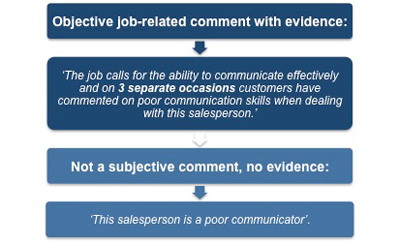 |
Many books recommend that you announce any bonus or pay increase at the appraisal meeting, but this can give the impression that the outcome of the appraisal was a foregone conclusion and that the team member never really had any influence over their performance rating. In addition, many organizations will not formally sign off bonuses or promotions until all appraisals have been completed throughout the whole organization.
You may also be interested in:
Appraisal Meeting Tips | Appraisal Forms Format | Appraisal Meeting Structure | Appraisal Goals and Objectives | Appraisal Discussion Points.



